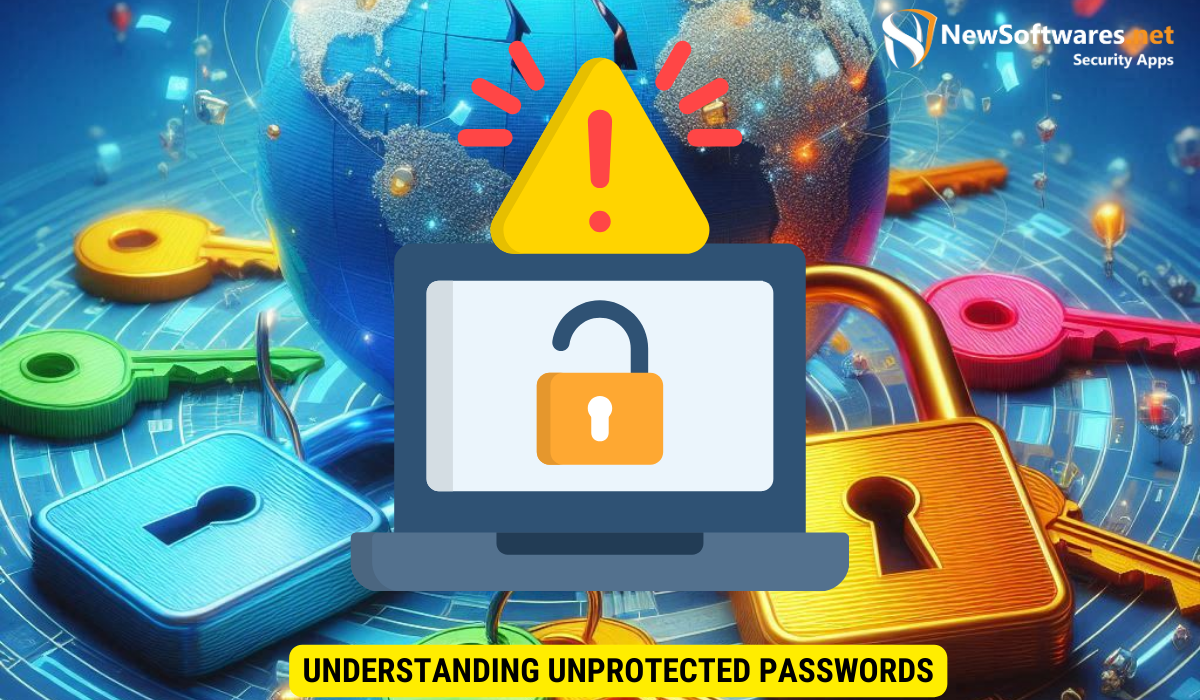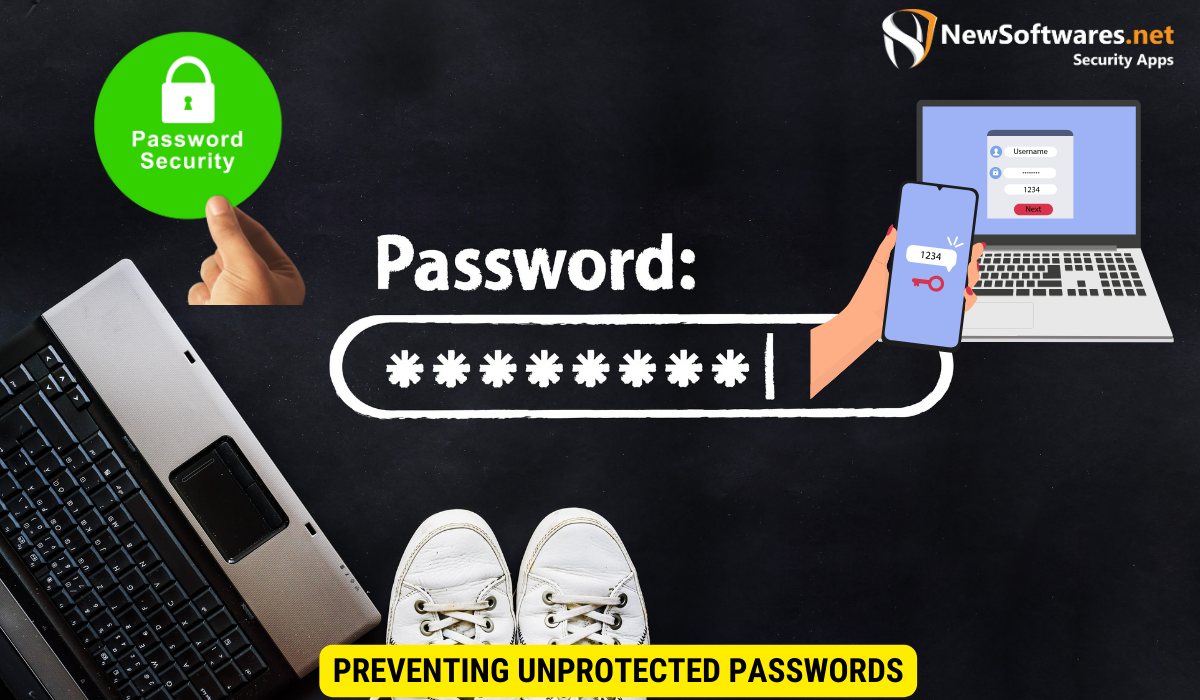When passwords are not protected, it can lead to a variety of serious consequences, including: • Data breaches, where sensitive information is accessed without authorization. • Identity theft, where personal information is stolen to commit fraud. • Computer hijacking, where unauthorized users gain control of a computer system. • Blackmail, where stolen information is used to extort victims. • Loss of privacy, where personal details are exposed to the public.
These risks highlight the importance of strong password policies and practices to safeguard personal and organizational data.
In today’s digital age, where technology plays a central role in our personal and professional lives, the importance of safeguarding our online security cannot be stressed enough. One of the most significant aspects of online security is the protection of passwords. Unfortunately, many individuals and organizations fail to recognize the potential consequences of unprotected passwords, putting themselves at risk for various cybersecurity threats. Together, we will delve into the ramifications of unprotected passwords and explore strategies to mitigate this vulnerability.
Understanding Unprotected Passwords

Before we explore the consequences of unprotected passwords, it is essential to have a clear understanding of what this term entails. Unprotected passwords refer to passwords that are easily accessible, predictable, or used across multiple platforms. By neglecting to implement adequate security measures, individuals and organizations leave themselves vulnerable to hacking attempts and unauthorized access to sensitive information.
It is crucial to recognize that the issue of unprotected passwords goes beyond mere inconvenience; it poses a significant threat to personal privacy and data security. The prevalence of unprotected passwords in today’s digital landscape highlights the importance of education and awareness regarding proper password practices.
Defining Unprotected Passwords
Unprotected passwords encompass a wide range of security flaws. These can include simple and commonly used passwords such as “123456” or “password,” as well as passwords that are easily guessable based on personal information, such as names or birth dates. Additionally, the reuse of passwords across multiple accounts increases the risk of a security breach, as a compromised password can grant unauthorized access to various platforms.
Furthermore, the use of weak passwords not only jeopardizes individual accounts but can also have far-reaching consequences for businesses and organizations. A single compromised password within a network of interconnected systems can lead to a domino effect of security breaches, potentially resulting in data leaks and financial losses.
Common Mistakes Leading to Unprotected Passwords
Many individuals unknowingly make mistakes that compromise the security of their passwords. Some common mistakes include using easily guessable passwords, such as words found in the dictionary or personal information. Lack of regular password updates and failure to implement additional security measures such as two-factor authentication also contribute to the vulnerability of passwords.
Moreover, the human factor plays a significant role in the prevalence of unprotected passwords. Psychological studies have shown that individuals often prioritize convenience over security when creating and managing their passwords, leading to a false sense of security and increased susceptibility to cyber threats.
The Risks Associated with Unprotected Passwords
The consequences of unprotected passwords extend far beyond a mere inconvenience. They can have severe implications for individuals, businesses, and even society as a whole. Understanding these risks is crucial for raising awareness and promoting the adoption of robust password protection practices.
Personal Information at Risk
When an individual’s password is compromised, personal information becomes vulnerable to misuse and identity theft. Cybercriminals can exploit this data to gain unauthorized access to financial accounts, social media profiles, and other sensitive platforms. This can result in significant financial losses and the invasion of privacy.
Financial Consequences of Unprotected Passwords
For businesses and individuals alike, financial implications can be a harsh reality of unprotected passwords. A security breach can result in stolen financial information, unauthorized transactions, and irrevocable damage to one’s financial reputation. Recovering from such financial losses can be a long and arduous process, often requiring legal intervention and substantial financial resources.
Business and Professional Risks
For businesses, the consequences of unprotected passwords go beyond financial ramifications. A data breach can tarnish a company’s reputation and erode customer trust. Moreover, sensitive business information, such as trade secrets or intellectual property, can fall into the wrong hands, potentially leading to devastating consequences for the organization.
The Psychological Impact of Data Breaches
In addition to the tangible consequences, the psychological impact of data breaches on individuals cannot be overlooked. Being a victim of a security breach often results in heightened stress and anxiety. The realization that personal information is no longer secure can undermine one’s sense of safety and privacy, leading to long-term emotional distress.
Stress and Anxiety from Data Breaches
Data breaches can leave individuals in a constant state of fear and unease, worrying about the potential misuse of their personal information. The psychological toll this takes can affect overall well-being, causing difficulties in interpersonal relationships, work productivity, and personal fulfillment.
The Long-term Emotional Effects
The emotional effects of a data breach can linger long after the initial incident. Individuals may experience feelings of betrayal, violation, and distrust. Rebuilding a sense of security and recovering from the emotional fallout can be a challenging and lengthy process.
Preventing Unprotected Passwords

While the consequences of unprotected passwords may seem daunting, there are proactive measures one can take to mitigate this risk. By investing time and effort into adopting strong password practices and implementing additional security measures, individuals and organizations can minimize their susceptibility to cybersecurity threats.
Importance of Strong Passwords
A strong password serves as the first line of defense against unauthorized access. It should be a unique combination of letters, numbers, and special characters, making it difficult for hackers to guess. Regularly updating passwords and refraining from reusing them across different accounts is essential for maintaining robust online security.
Role of Two-Factor Authentication
In addition to strong passwords, implementing two-factor authentication adds an extra layer of security. This process requires users to provide an additional form of verification, such as a unique code sent to their mobile device, further safeguarding their accounts from unauthorized access.
Password Managers and Their Benefits
Managing multiple complex passwords can become cumbersome, leading individuals to resort to weak passwords or reusing them across accounts. Password managers provide a convenient solution by securely storing and generating strong passwords, eliminating the need for memorization while enhancing overall security.
Legal Consequences of Unprotected Passwords
One cannot overlook the potential legal ramifications associated with unprotected passwords. Governments worldwide have recognized the importance of data protection and enacted laws to hold individuals and organizations accountable for negligence regarding password security.
Laws Regarding Data Protection
Data protection laws vary across jurisdictions, but most require organizations to implement reasonable security measures to protect sensitive information. These measures often include robust password practices and encryption protocols. Failure to comply with these laws can result in legal penalties and damage to an organization’s reputation.
Potential Legal Penalties for Negligence
In cases where a security breach occurs due to negligence or failure to ensure adequate password protection, legal consequences can be severe. Organizations may face lawsuits, financial penalties, and, in some cases, criminal charges. These legal repercussions highlight the importance of prioritizing password security and implementing best practices.
Key Takeaways
- Unprotected passwords leave individuals and organizations susceptible to various cybersecurity threats, including identity theft and financial losses.
- The psychological impact of data breaches can result in heightened stress, anxiety, and long-term emotional distress.
- Preventing unprotected passwords requires the adoption of strong password practices, two-factor authentication, and the use of password managers.
- Data protection laws exist to hold individuals and organizations accountable for negligence regarding password security.
- Prioritizing password security is crucial for safeguarding personal information, financial well-being, and overall online security.
FAQs
Why are unprotected passwords so risky?
Unprotected passwords are risky because they provide easy access for cybercriminals to sensitive information, leading to potential identity theft, financial losses, and business reputation damage.
What can I do to protect my passwords?
You can protect your passwords by using strong, unique combinations of letters, numbers, and special characters. Implementing two-factor authentication and considering the use of password managers can enhance password security.
What legal consequences can I face for unprotected passwords?
If negligence regarding password security leads to a data breach, you may face legal consequences that can include lawsuits, financial penalties, and, in some cases, criminal charges.
How can data breaches impact individuals psychologically?
Data breaches can lead to heightened stress, anxiety, and long-term emotional distress due to the violation of privacy and the ongoing fear of personal information misuse.
Are there data protection laws regarding password security?
Many jurisdictions have implemented data protection laws that require organizations to implement reasonable security measures, including password protection, to safeguard sensitive information.
Conclusion
The consequences of unprotected passwords cannot be underestimated. From personal information theft and financial losses to psychological distress and legal consequences, the risks associated with neglecting password security are far-reaching. It is vital that individuals and organizations recognize the importance of protecting passwords and take active steps to mitigate the threat. By adopting strong password practices, implementing additional security measures, and staying informed about data protection laws, we can fortify our online security and ensure a safer digital future.
